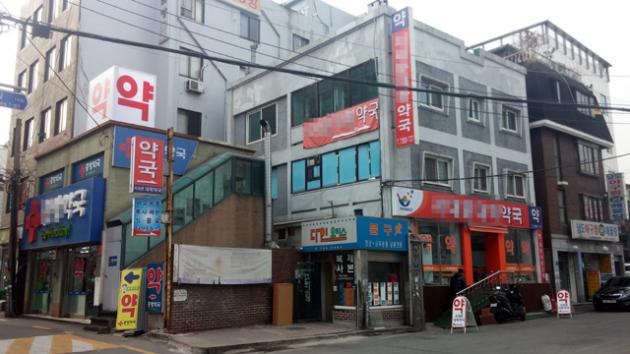Druggists fear medicinal version of supermarkets crowding out mom-and-pop stores
Koreans work hard. They are second-hardest working people among OECD nations -- with 2,113 hours a year as of 2015. Koreans engaged in some occupations work even far harder than others, however.
Among such jobs are pharmacists. According to a survey, the annual working hours of druggists amounted to 3,232 hours, 1,119 hours longer than the national average. If their monthly or bimonthly Sunday work is included, pharmacists put in nearly 50 percent more hours than other breadwinners.
"The survey result shows there is absolutely no time for the self-development of pharmacists because of their poor working environment,” said Kim Dae-won, deputy chief of Gyeonggi Provincial Pharmaceutical Association. “This is also a factor that sharply lowers the quality of life and reduces job satisfaction of pharmacists in the country.”
One might think then these pharmacists would welcome increasing the size of drugstores and hiring more druggists to reduce their workload.
Nothing could be further from the truth, however.
The Korea Pharmacists Association (KPA) has recently delivered their policy recommendations to major presidential candidates campaigning for the May 9 polls. The policy proposals included, among others, KPA’s adamant opposition to the government’s move to introduce “corporate-style” pharmacies, as are the cases in the United States, the United Kingdom, and Singapore.
Under the Pharmaceutical Affairs Act, not businesses corporations but individual pharmacists can open pharmacies in Korea and only one store for each. That means corporate-type pharmacies cannot exist in this country without amending laws.
In 2002, the Constitutional Court opened the way for such legal revision, by ruling the ban on company-type drugstores “unconstitutional.” The Ministry of Health and Welfare, however, has been dragging its feet to amend the law for fear of triggering strong protests from KPA and its members.
The KPA, along with Traffic Broadcasting System (TBS) has conducted a campaign, as part of its public relations activities to block corporate pharmacies, calling them “chaebol-like pharmacies” and promote the current neighborhood stores.
The druggists are rejecting the government’s move for fear of large franchise drugstores crowding out self-employed stores as supermarkets have driven mom-and-pop stores out of business, as the store sizes grew and competition becomes fiercer, industry watchers say.
Consumers, of course, think differently.
“If I had to choose between small individual pharmacies and big corporate-type stores, I would choose the latter,” said Park Young-soon, a consumer in her mid-40s. “Corporate pharmacies tend to have a wider variety of drugs that I can choose from. They also can increase late night shifts and still open on holidays.”
The ministry has also resumed its attempts to introduce franchise pharmacies. At the 11th Trade and Investment Promotion Council meeting on March 27, the participants discussed the disuse as part of the administration’s moves to bolster the sluggish economy by reinvigorating business investment.

"I think it is necessary to have corporate-type pharmacies in the form of a cooperative rather than a corporation." said Goh Hyung-woo, director of the ministry’s Public Health Division.
Goh said the ministry is also pushing to increase the number of items and sales points for household drugs. "Of course, the ministry will not push for these unilaterally but listen to the opinions of related organizations such as KPA.”
To sum up, the industry analysts say, pharmacists prefer working long hours to maximize revenue at their own pharmacies leading hectic lives to be reduced to wage earners at company pharmacies, even if that means more leisurely lives.
As long as their adherence to status quo prevails and the government’s lukewarm stance that puts vested interest groups ahead of public well-being, Korean will have a long way to go before seeing the likes of CVS Pharmacy, Walgreens, and Boots in this country, they said.

